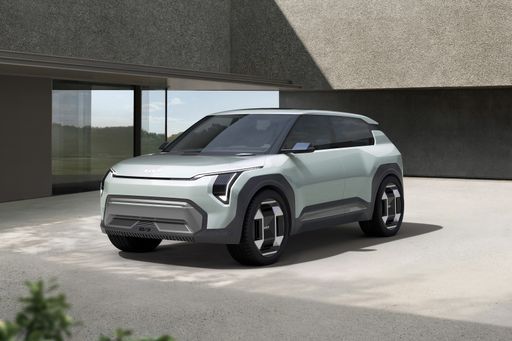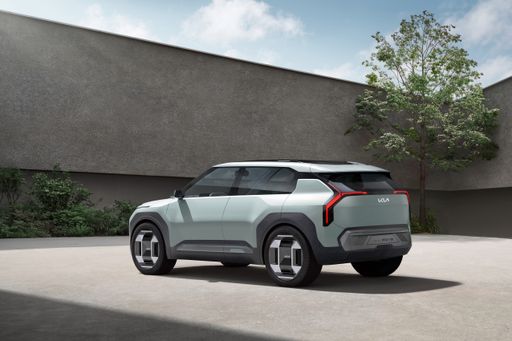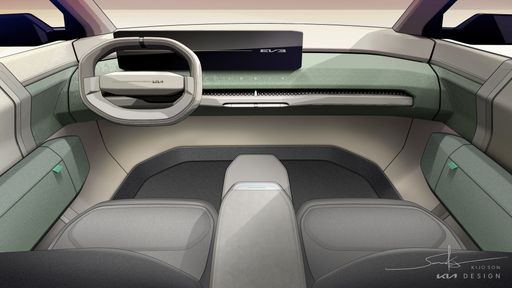The automotive landscape is continuously evolving, especially with the increasing demand for electric vehicles. In this comparison, we delve into two standout options in the compact SUV segment: the Hyundai Kona and the Kia EV3. Both models represent their manufacturers' commitment to innovation and efficiency, but how do they stack up against each other in various aspects? Let's explore the technical specifications, innovations, and unique features of these vehicles.
Hyundai Kona vs Kia EV3 - Differences and prices compared
Compare performance (218 HP vs 204 HP), boot space and price (23100 £ vs 30800 £ ) at a glance. Find out which car is the better choice for you – Hyundai Kona or Kia EV3?
Design & Dimensions
The Hyundai Kona and Kia EV3 both embody the modern SUV aesthetic but with distinct design languages. The Kona measures in with a length of 4350 mm and a width of 1825 mm, featuring a robust and sporty look that appeals to adventure seekers. In comparison, the Kia EV3, measuring slightly shorter at 4300 mm with a wider frame of 1850 mm, offers a sleek design with elegant lines that appeal to urban drivers.
Powertrains and Performance
The Hyundai Kona provides a diverse range of powertrain options. It is available with petrol, full hybrid, and electric engines, offering a horsepower range from 100 HP to 218 HP. The electric variant boasts a battery capacity of up to 65.4 kWh, delivering an impressive electric range of up to 514 km. Notably, it accelerates from 0-100 km/h in just 7.8 seconds, demonstrating its sporty capability.
On the other hand, the Kia EV3 is exclusively electric, featuring a robust 204 HP engine that helps it achieve a 0-100 km/h time of 7.5 seconds. The EV3 comes equipped with a battery capacity that can reach 81.4 kWh, giving it an impressive range of up to 605 km, making it a strong contender for those looking to reduce their frequency of charging.
Efficiency and Consumption
When it comes to efficiency, the Hyundai Kona offers a variety of consumption figures depending on the chosen engine. The fully electric model consumes approximately 14.6 kWh/100 km, proving itself as a fuel-efficient option. Conversely, the Kia EV3 generally ranges from 14.9 to 16.2 kWh/100 km, which is still competitive but slightly higher than Kona's most efficient electric option.
Interior and Comfort
Both vehicles comfortably seat five passengers and offer ample interior space. The Kona provides 466 liters of trunk capacity, making it practical for family outings or shopping trips. The Kia EV3, while slightly less spacious at 460 liters, incorporates a user-friendly interior layout with advanced infotainment systems, contributing to a premium feel.
Safety and Technology
Technology plays a vital role in both cars. The Kona is equipped with Hyundai’s SmartSense safety features, ensuring a comprehensive range of active safety technologies. On the other hand, the Kia EV3 embraces an array of cutting-edge connectivity technologies and driver-assist features like enhanced lane-keeping assistance and adaptive cruise control.
Conclusion: Choosing the Right SUV
Ultimately, the choice between the Hyundai Kona and Kia EV3 boils down to personal preferences and driving needs. The Kona shines with its diverse powertrain options and sporty dynamics, while the Kia EV3 is perfect for those seeking a larger electric range and cutting-edge technology in a sleek, well-designed package. As both vehicles push the boundaries of what's possible in the compact SUV segment, they each bring something unique to the table for today's eco-conscious consumer.
Here’s where it gets real: The technical differences in detail
Costs and Efficiency:
Price and efficiency are often the first things buyers look at. Here it becomes clear which model has the long-term edge – whether at the pump, the plug, or in purchase price.
Hyundai Kona has a distinct advantage in terms of price – it starts at 23100 £ , while the Kia EV3 costs 30800 £ . That’s a price difference of around 7791 £.
In terms of energy consumption, the advantage goes to the Hyundai Kona: with 14.60 kWh per 100 km, it’s slight more efficient than the Kia EV3 with 14.90 kWh. That’s a difference of about 0.30 kWh.
As for electric range, the Kia EV3 performs somewhat better – achieving up to 605 km, about 91 km more than the Hyundai Kona.
Engine and Performance:
Power, torque and acceleration say a lot about how a car feels on the road. This is where you see which model delivers more driving dynamics.
When it comes to engine power, the Hyundai Kona has a hardly perceptible edge – offering 218 HP compared to 204 HP. That’s roughly 14 HP more horsepower.
In acceleration from 0 to 100 km/h, the Kia EV3 is slight quicker – completing the sprint in 7.50 s, while the Hyundai Kona takes 7.80 s. That’s about 0.30 s faster.
In terms of top speed, the Hyundai Kona performs a bit better – reaching 210 km/h, while the Kia EV3 tops out at 170 km/h. The difference is around 40 km/h.
There’s also a difference in torque: Kia EV3 pulls barely noticeable stronger with 283 Nm compared to 265 Nm. That’s about 18 Nm difference.
Space and Everyday Use:
Whether family car or daily driver – which one offers more room, flexibility and comfort?
Both vehicles offer seating for 5 people.
In curb weight, Hyundai Kona is evident lighter – 1370 kg compared to 1800 kg. The difference is around 430 kg.
In terms of boot space, the Hyundai Kona offers barely noticeable more room – 466 L compared to 460 L. That’s a difference of about 6 L.
In maximum load capacity, the Hyundai Kona performs barely noticeable better – up to 1300 L, which is about 49 L more than the Kia EV3.
When it comes to payload, Hyundai Kona barely noticeable takes the win – 490 kg compared to 470 kg. That’s a difference of about 20 kg.
Who wins the race in the data check?
The Hyundai Kona is clearly superior overall in the objective data comparison.
This result only shows which model scores more points on paper – not which of the two cars feels right for you.
Costs and Consumption
View detailed analysis
Engine and Performance
View detailed analysis
Dimensions and Body
View detailed analysis

Hyundai Kona
Hyundai Kona
The Hyundai Kona wears its personality on the outside with bold styling and sprightly handling that turns city driving into something a little more fun than a commute. It blends practical space, modern tech and sensible running costs into a compact, stylish package — a smart pick if you want flair without paying luxury prices.
details



Kia EV3
The Kia EV3 arrives as a cheeky, practical electric compact that manages to feel both premium and playful, delivering crisp handling and a roomy cabin that's perfect for urban life. With smart tech, friendly styling and sensible pricing, the EV3 is the kind of car that makes switching to electric feel like a no-brainer without asking you to give anything important up.
details


Costs and Consumption |
|
|---|---|
|
Price
23100 - 41600 £
|
Price
30800 - 41700 £
|
|
Consumption L/100km
4.6 - 7 L
|
Consumption L/100km
-
|
|
Consumption kWh/100km
14.6 - 16.8 kWh
|
Consumption kWh/100km
14.9 - 16.2 kWh
|
|
Electric Range
377 - 514 km
|
Electric Range
436 - 605 km
|
|
Battery Capacity
1.3 - 65.4 kWh
|
Battery Capacity
58.3 - 81.4 kWh
|
|
co2
0 - 163 g/km
|
co2
0 g/km
|
|
Fuel tank capacity
38 - 47 L
|
Fuel tank capacity
-
|
Dimensions and Body |
|
|---|---|
|
Body Type
SUV
|
Body Type
SUV
|
|
Seats
5
|
Seats
5
|
|
Doors
5
|
Doors
5
|
|
Curb weight
1370 - 1773 kg
|
Curb weight
1800 - 1885 kg
|
|
Trunk capacity
466 L
|
Trunk capacity
460 L
|
|
Length
4350 - 4385 mm
|
Length
4300 - 4310 mm
|
|
Width
1825 mm
|
Width
1850 mm
|
|
Height
1580 - 1585 mm
|
Height
1560 - 1570 mm
|
|
Max trunk capacity
1300 L
|
Max trunk capacity
1251 L
|
|
Payload
420 - 490 kg
|
Payload
470 kg
|
Engine and Performance |
|
|---|---|
|
Engine Type
Electric, Petrol, Full Hybrid
|
Engine Type
Electric
|
|
Transmission
Automatic, Manuel
|
Transmission
Automatic
|
|
Transmission Detail
Reduction Gearbox, Manual Gearbox, Dual-Clutch Automatic
|
Transmission Detail
Reduction Gearbox
|
|
Drive Type
Front-Wheel Drive, All-Wheel Drive
|
Drive Type
Front-Wheel Drive
|
|
Power HP
115 - 218 HP
|
Power HP
204 HP
|
|
Acceleration 0-100km/h
7.8 - 11.9 s
|
Acceleration 0-100km/h
7.5 - 7.9 s
|
|
Max Speed
162 - 210 km/h
|
Max Speed
170 km/h
|
|
Torque
200 - 265 Nm
|
Torque
283 Nm
|
|
Number of Cylinders
3 - 4
|
Number of Cylinders
-
|
|
Power kW
85 - 160 kW
|
Power kW
150 kW
|
|
Engine capacity
998 - 1598 cm3
|
Engine capacity
-
|
General |
|
|---|---|
|
Model Year
2024 - 2025
|
Model Year
2024
|
|
CO2 Efficiency Class
A, D, C, E, F
|
CO2 Efficiency Class
A
|
|
Brand
Hyundai
|
Brand
Kia
|
Is the Hyundai Kona offered with different drivetrains?
Available configurations include Front-Wheel Drive or All-Wheel Drive.
